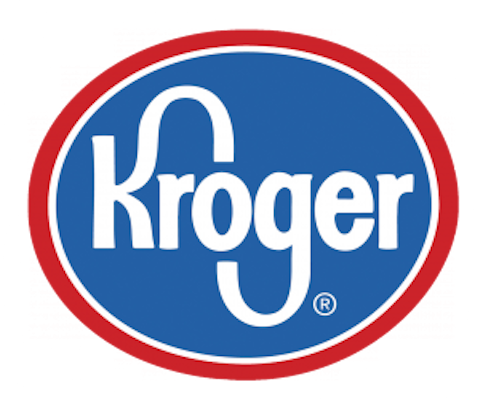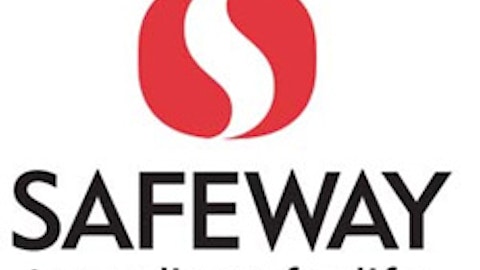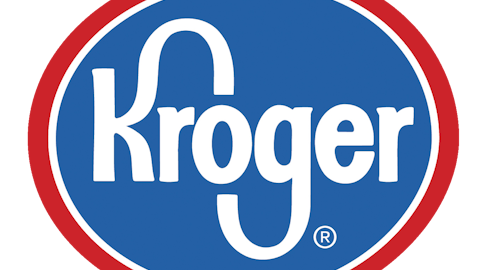
All Cash
Harris Teeter Supermarkets Inc (NYSE:HTSI) announced at the start of the year that it was considering selling itself. Since that point the shares have advanced around 30%. The Kroger Co. (NYSE:KR)’s all-cash offer is only slightly above where the stock traded hands the day before the announcement. In other words, the news didn’t have much of an impact.
Although Harris Teeter Supermarkets Inc (NYSE:HTSI) had a good run on the top and bottom lines leading into the recession, performance hasn’t been as consistent since that point. For example, although sales increased in 2009, margin compression led to a year over year earnings decline. The next year saw sales improvement coupled with margin expansion leading to a decent bottom line gain. Margins, however, have headed lower since and sales seesawed lower in 2011 and higher again 2012. Lower margins, though, left earnings lower in each those years.
There’s a reason why the company has been looking to sell itself. Although there might be competing offers, Harris Teeter Supermarkets Inc (NYSE:HTSI) shares appear to have fully priced in an acquisition. Shareholders should sell to lock in gains.
What’s the Buyer Get
The Kroger Co. (NYSE:KR) is the nation’s largest public supermarket. It’s grown through both organic expansion and acquisition, so adding Harris Teeter Supermarkets Inc (NYSE:HTSI) is probably a logical move. Still, with about $4.5 billion in revenues, Harris Teeter Supermarkets Inc (NYSE:HTSI) is tiny compared to The Kroger Co. (NYSE:KR)’s nearly $97 billion in revenue. That said, there’s little overlap between the two grocers, so it helps to expand The Kroger Co. (NYSE:KR)’s footprint.
What it doesn’t do is change the trajectory of the grocery industry. For example, after dipping to around 1.5% in 2011, The Kroger Co. (NYSE:KR)’s margins about doubled in 2012. Still, at just under 3%, those margins are below Harris Teeter’s 3.8% margins. Although Kroger’s size should allow it to squeeze some costs out of the 200 or so acquired stores, the acquisition isn’t going to notably alter the margins at Kroger’s over 2,500 store base.
The grocery business is highly competitive right now and will remain tough for the foreseeable future. Wal-Mart Stores, Inc. (NYSE:WMT) and Target Corporation (NYSE:TGT) have both made aggressive pushes into the space and have been more than willing to compete on cost.
The pair have essentially been using grocery items as loss leaders to sell their other wares. Kroger only sells groceries. In the end, Kroger is a good company doing the right things in a troubled industry.
An Alternative
Those interested in the grocery isle should avoid the traditional grocery stores and look to Whole Foods Market, Inc. (NASDAQ:WFM) instead. Whole Foods Market, Inc. (NASDAQ:WFM) sells groceries, but focuses on organic and “healthy” fare. This, plus the effort to create a more pleasant shopping experience, allows the company to charge more as it rides the trend toward healthier lifestyles.
While small compared to Kroger, with around $11.5 billion in sales last year, Whole Foods Market, Inc. (NASDAQ:WFM) margins dipped as low as 3.5% during the recession. That’s better than Kroger’s margins today, and represent the low point for Whole Foods Market, Inc. (NASDAQ:WFM) over the past ten years. In 2012, Whole Foods Market, Inc. (NASDAQ:WFM) profit margin was around 6.4%.
And Whole Foods Market, Inc. (NASDAQ:WFM) only has about 350 stores, so there’s plenty of growth potential ahead. While it may never have as many stores as industry leader Kroger, Whole Foods should easily be able to to triple its count over the next decade or two. So there’s plenty of growth potential ahead for a company that increased sales every year over the past decade, taking the top line from about $3 billion to over $11.5 billion.
Follow the Leader
Kroger is the largest in the grocery industry, but that doesn’t actually make it the leader today. Whole Foods has taken a different approach to the business and is now the company to beat. Investors interested in the space would be better served paying up for premium priced Whole Foods and its near 40 price to earnings ratio than latching onto a lumbering giant at a discount PE of 13.
Kroger is just too big to grow like Whole Foods and at the same time take on tough competitors moving into its space. The Harris Teeter deal doesn’t change that. Harris Teeter investors, meanwhile, should sell to lock in any gains they have since the shares are unlikely to go much higher from here.
Reuben Brewer has no position in any stocks mentioned. The Motley Fool recommends Whole Foods Market (NASDAQ:WFM). The Motley Fool owns shares of Whole Foods Market. Reuben is a member of The Motley Fool Blog Network — entries represent the personal opinion of the blogger and are not formally edited.
The article Consolidation in a Bad Industry Doesn’t Make Good Businesses originally appeared on Fool.com is written by Reuben Brewer.
Copyright © 1995 – 2013 The Motley Fool, LLC. All rights reserved. The Motley Fool has a disclosure policy.





